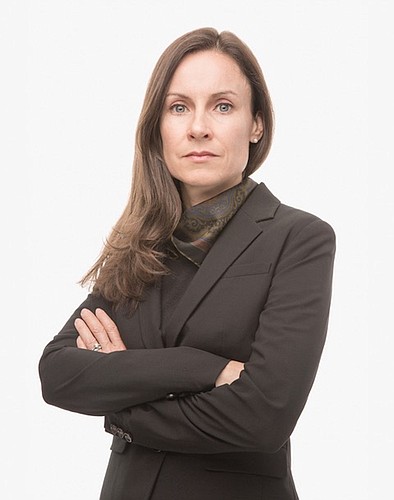- December 13, 2025
-
-
Loading

Loading

Camille Renshaw has always had an interest in technology and how things work.
When the self-described “tech geek” was in middle school, that manifest itself when she took up a new hobby: computer coding.
In college, the Tennessee native worked on a project tied to artificial intelligence, and upon graduation worked for a series of tech-related startups.
She had little interest in her family’s real estate investment firm, Renshaw Cos., until she started investing herself in the early 2000s in net-lease properties — think stand-alone Starbucks or CVS stores — where tenants pay rent plus expenses such as taxes or insurance.
“I saw them more as financial instruments and realized I could apply my tech interest and background to them,” says Renshaw. “They appealed to my geek side, and my background allowed me to assess risk in a different way.”
In 2004, Renshaw joined commercial real estate brokerage Colliers International and fell in love with brokerage and working with clients. Within six years, she was among 40 top global producers at the company.
That performance, in part, prompted Stan Johnson Co., a Tulsa, Okla.-based brokerage firm that focuses on net-lease deals and sale-leaseback transactions, to recruit Renshaw in 2011.
In 2016, Renshaw joined Ten-X Commercial Real Estate, an Irvine, Calif.-based digital sales platform that links buyers, sellers and brokers, as head of sales. There, she further refined her interest in tech and how it might be applied to commercial real estate.
Each of those experiences married and co-mingled in late 2017, when Renshaw and a business partner formed B+E — brokers plus engineers — with the goal of fully integrating technology into the commercial real estate brokerage experience.
Buoyed by her history at Stan Johnson and Ten-X, as well as her own interests, Renshaw decided B+E would specialize in the aforementioned triple net-lease sales, together with 1031 property exchanges — deals in which sellers can defer paying taxes on properties if they meet certain criteria with future purchases.
“We’re creating an eco-system for net lease,” says Renshaw, B+E’s CEO. “What I find particularly exciting about it is that it’s so simple for everyone to understand. It functions a lot like a security.”
As investors have flocked to single-tenant deals because of their cash flow and predictability, the company has, in turn, ramped up quickly. Today, B+E has 40 employees and maintains six offices, including joint bases in New York and Tampa.
In the past year, B+E has participated in online property sales totaling $750 million — including a May 2019 deal involving 11 Cabela stores totaling 1.6 million square feet and 277 acres of land.
In keeping with Renshaw’s root interest, B+E has integrated or applied technology to nearly every facet of the business.
Mathematical algorithms track both potential buyers and transactions. An internal database keeps tabs on more than 3,000 net-lease properties available nationwide.
Renshaw says that net-lease deals also provide brokers the opportunity to track traffic counts, store sales and other data in ways multi-tenant properties can’t.
“There’s so much information on these properties, which adds value to the assets,” she says.
The company also has formulated “real-time predictive pricing, an artificial intelligence-driven exchange and online dashboards for buyers and sellers.
At the same time, B+E has created a stock exchange-mimicking online platform where transactions can be done from start to finish, which the company says “affords greater speed, unrivaled transaction efficiencies and stronger asset value.”
On the other side of its business, B+E has launched what it calls “1031 Trade,” an online trading platform for tax-deferred deals.
“We’re very, very different in our approach than the average brokerage firm,” Renshaw says.
The industry has noticed. Earlier this year, Globe Street Real Estate Forum named Renshaw one of the nation’s top commercial real estate “tech influencers,” in recognition of those who’ve helped “streamline CRE processes through technology.”
For now, at least, Renshaw is too busy to spend much time reflecting on the accolades.
As the COVID-19 pandemic has spread, investors have flocked to triple-net deals for their certainty and relative low risk.
“That’s especially important right now,” Renshaw says. “Net lease deals, in addition to their simplicity, are fairly low risk when they’re structured properly. So when crisis comes the net lease sector thrives. I personally hate that we’re in crisis mode as a nation, but our business is open and very active. Everybody is working overtime right now.”
Moving forward, in what Renshaw hopes will be a post-coronavirus business environment, she plans to continue to build the triple-net lease “eco-system” with increased overall capital and market liquidity.
By 2025, she’d like B+E to have an in-house debt instrument in place, too.
She’d also like have more women, people of color and younger investors engaged and more global investors, and expand the sector’s offerings to include such non-traditional investments like billboards and cellular phone towers.
But mainly, she wants triple-net lease deals to gain wider notoriety and acceptance among both large institutional and individual investors alike.
“I think we’ll get there fairly quickly,” she says. “Even before the novel coronavirus, we were already the fastest-growing segment of the real estate industry nationally, which is understandable — because it’s the most secure form of commercial property investment.”